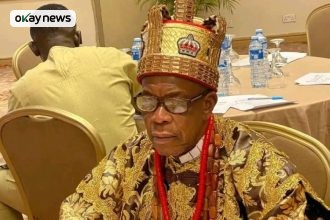Okay News reports that Ogun State Governor, Dapo Abiodun, has announced a comprehensive security overhaul following what he described as worrying intelligence about illegal migration and criminal infiltration across the state. The governor disclosed the measures on Monday during a briefing at his Iperu Remo residence after meeting with key security chiefs drawn from Nigeria’s major security institutions.
Ogun State, located in Southwest Nigeria and serving as the country’s leading industrial hub with direct border access to the Republic of Benin, has recently recorded an increase in the arrival of undocumented foreign nationals. Abiodun said the state government will now begin the compulsory registration of all foreign nationals and non-indigenes residing or working in the state.
According to him, the move is a preventive step to stop individuals entering the state illegally from using Ogun’s industrial communities, border towns, and forest corridors as bases for unlawful activities. He revealed that security agencies have already arrested not fewer than 70 persons from Chad and Sudan within the last four days, all lacking clear reasons for entering the state or any explanation of where they were headed.
The governor explained, “Being an industrial capital with many people coming from different parts of the world to set companies here in the state, we discovered that some of the workers in this company are not documented and we have resolved that all those who have come to make the state their home, all these foreign nationals are documented.”
He added that the registration exercise would be carried out jointly with the Nigeria Police Force and the Nigeria Immigration Service to ensure proper identification and legal compliance. Abiodun also stated, “So, we have resolved to register any non-indigenes that come into our state so we know who they are, why they are here and what they are doing in the state.”
The meeting, attended by the Commissioner of Police Lanre Ogunlowo; State Commandant of the Nigeria Security and Civil Defence Corps Remi Ekundayo; and Brigadier General Godwin Nwamba of the 35 Artillery Brigade, among others, also reviewed emerging threats, particularly the activities of criminal gangs using informal settlements such as “Zanga” in Ijebu-Ode as hideouts.
Abiodun said he has mandated security agencies to storm such enclaves and demolish any structures used by criminals. He reminded the public of an existing state law that permits the demolition of any building harbouring criminals and prosecution of landlords who enable such behaviour.
The governor also announced increased surveillance on scrap dealers and scavengers, noting that some disguise their operations to gather intelligence for criminal groups. He added that the state would intensify its crackdown on illegal miners and individuals hiding in forest reserves to carry out unlawful activities.
On traditional rulers, Abiodun issued a firm warning against allocating land to strangers without government approval, emphasizing that all lands belong to the state. He stated, “We shall not condone any act appearing to be sabotaging our commonwealth and security.”
To strengthen border security, the governor requested the establishment of a Forward Operating Base in Ilara, a border community in Yewa North Local Government Area.
Abiodun also responded to viral reports of insecurity in Ajebo, Obafemi-Owode Local Government, explaining that security agencies had assessed the area and found no imminent threat, although it remains under surveillance.
He called on residents to take collective responsibility for community safety, advising, “We must be responsible citizens, we must be observant, we must be our neighbours’ keepers.”
The governor commended President Bola Tinubu for national security efforts, especially the recent rescue of 38 worshippers kidnapped in Kwara State during a church service in Eruku, following a wave of violent school and church attacks across northern Nigeria.
The governor’s briefing followed a series of coordinated abductions across Niger, Kebbi, Kwara, and Katsina states that prompted the Federal Government to close 41 unity schools and several northern governors to shut down institutions over rising insecurity.







